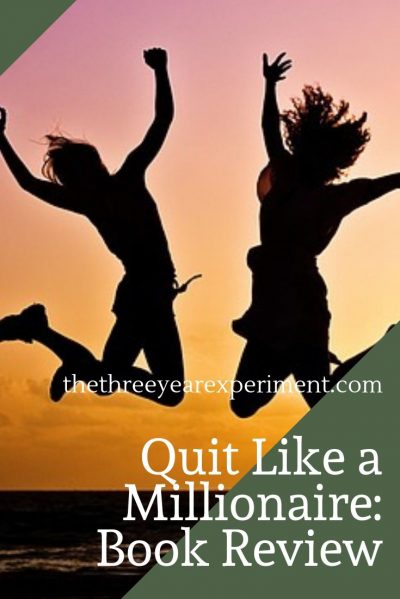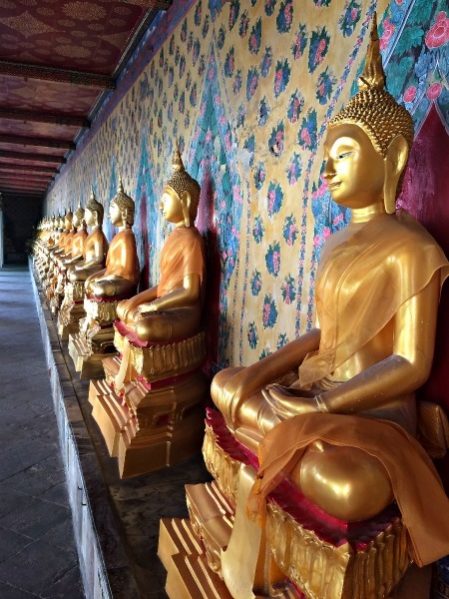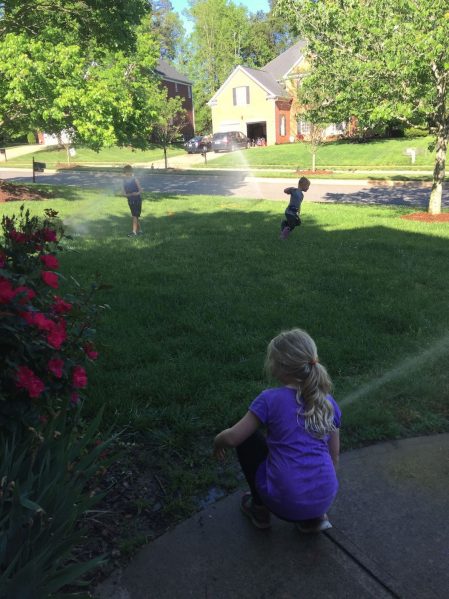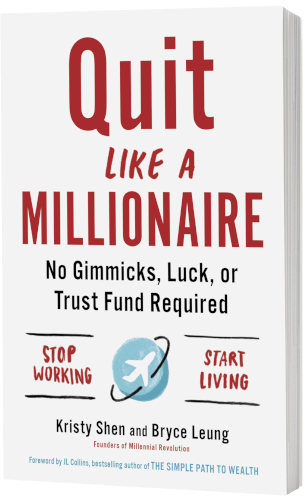This post contains an affiliate link or two. If you decide to buy the books I recommend, instead of checking them out from the library like I do, I may get some pocket change. I appreciate it because who doesn’t want a little extra pocket change?
I am, unsurprisingly, a fan of personal finance books. I dutifully read anything related to personal finance that appears on the market, usually placing an online hold for the book through my library.
I’ll often read an article about the book then log in to my online library and get in line, so to speak.
Last week, when the book Quit Like a Millionaire: No Gimmicks, Luck, or Trust Fund Required, by Kristy Shen and Bryce Leung showed up in my checked-out books, I was surprised. I’d forgotten I’d placed a hold on it, forgotten what it was about, forgotten who wrote it.
Turns out, the book was written by a Canadian couple who were saving up to buy a house in Toronto then decided to keep renting, pocket their savings, and retire early, traveling the world instead.
The book is primarily written by Kristy Shen. I’m not even sure why Bruce Leung’s name is on it. Shen tells his story, sure, but it’s really her story, which intersects with his, that is the most interesting. And we certainly don’t hear his voice at all in the book.
The reason I’m writing a book review, which I do extremely rarely, is because I found this book to be a breath of fresh air.
Normally, when people write personal finance books or even early retirement books, they say a lot of the same things. They write some very dense chapters on savings rate and investments, and then the thing’s over.

Shen’s book is a little different. First off, the foreword is written by JL Collins, the ubiquitous New Hampshirite whose book, The Simple Path to Wealth, has become something of an investing bible for many.
Second, her childhood was a bit… unique, shall we say.
Shen grew up in rural China, and her family subsisted on just $.44 per day. Her entire family.
Because her dad did very well on a state exam, and his subsequent studies, her family was able to emigrate to Canada for his PhD program when she was a child.
Like many of my ESOL students who were raised in similar situations, Shen found the riches of the developed world to be astounding. She made her first can of Coke last a week, and then keeping the can with her wherever she went, even to bed.
When your family lives on $.44 per day, you get a new perspective on money. Shen’s dad wanted to buy her a toy, perhaps so his kid wouldn’t carry around the Coke can for her entire life, so he took her to the store and picked out a stuffed bear. She saw the price tag, $5.00, and realized her cousins back in China could eat for a week with that money. So she found another toy in the discount bin that cost just $.50 and made her dad send the $4.50 she’d saved him to her family in China.
Shen is a great writer and she’s hilarious. My favorite line of the book: “Please understand it’s not my intention to depict my culture as being all about physical abuse and abandonment issues; there are downsides as well.”
Okay, so the book is funny, and it tells heartwrenching stories of immigrants, one of my favorite topics. But are these the only reasons I loved it?
No, the real jewel of the book for me was the information on Sequence of Return Risk.
Shen describes how she and her husband saved up $1,000,000 Canadian dollars over a period of nine years. In detailed graphs in the Appendix, she shows exactly how much they earned, spent, and saved, each year. Both were engineers and made a total of $164,000 (after tax) in their last year of working.
Their plan was to travel the world for a year, then figure out what to do with the rest of their lives. But they spent so little in world travel that first year that they decided to keep traveling.

One thing that they worried about, however, was the market tanking just as they retired (which they’d lived through in 2008, during the height of their saving years).
If they took 4% out of their portfolio during a multi-year bear market, they were afraid they’d run out of money.
Sequence of Return Risk
So, being the problem-solving engineers they were, they figured out a system. Because they didn’t want to have to have a huge amount of money in cash, which would only be receiving a small (maybe 2%) yield, in the form of interest, they did some math and figured out how they could create a higher yield for themselves during down years.
They came up with a solution they called a Yield Shield, which is essentially a way to temporarily shift their portfolio into assets that pay higher yields for those down years.
They have their money invested in a mix of stocks and bonds, in several index funds, but for down years, they shift some of their allocation to indexes with a higher yield in the form of interest and dividends (but also higher volatility).
For example, they invested in some Preferred Share bonds with a yield of 5.6% (amongst many other things). The actual share price of the bonds might swing wildly, but they’ll give out a yield of 5.6% in the form of dividends. They mix these higher-yielding but more-volatile funds in with safer funds to come up with the percentage yield they need during down years. So, if the couple knows they’ll receive a certain percentage from their portfolio, which they engineered to be 3.5%, they knew they would only need a cash cushion of $25,000, since they’d be receiving $35,000 in the form of dividends.
While that increased the volatility of their portfolio, it was only a temporary shift of assets to help them through lower-performing years. When the market cranked back up, they’d re-invest their money into less volatile investments and let their portfolio value recover.
This was the most dense chapter in the book, by far, but even this chapter was carefully explained in layman’s terms.
And it’s a really practical solution to the question of a down market during the first years of your retirement.
The Big Scary Questions: Kids and Healthcare
I appreciate that Shen takes the time to answer, as well as she can, questions about how to world travel with kids and what to do about healthcare.
These were questions we wrestled with frequently as we debated how our location independence would look.
She has a lot of great information about healthcare, which helped me think clearly about how we might insure when we retire.
Since she and Leung don’t have kids, she reached out to Mr. Money Mustache, Jeremy of Go Curry Cracker, and Justin of Root of Good to talk about how they retired (and/or traveled) with kids. They had some good advice, but in the end, I wasn’t convinced.
Let me make a bold statement. Believe it or not.
If you have kids, it’s not feasible to travel the world indefinitely.
But Laurie, you might be saying, this person and this person are doing it?!

It is possible, but that’s not what I said. I said it’s not feasible. It’s not very good for your kids long-term.
Think of all the army brats you know. Did any of them like moving from place to place their entire childhoods?
It’s really hard on kids, especially once they get to be a certain age, to move them around indefinitely. Kids need structure and stability, and because middle and high school years are those all-important social years, where kids are learning how to navigate social systems, they need to have the same friends and the same social systems year after year.
Sure, there are exceptions to the rule, but by and large, staying in one place with your kids for years at a time is probably better.
Even home-schooled kids have home-school groups, church youth group, and family around to provide social support networks. Moving from place to place makes it to hard to form those long-term support networks.
So if your plan is to permanently travel the world, and you have kids, maybe rethink your plan.
Luckily for Chen and Leung, they don’t have kids, so it’s a moot point.
They do have healthcare, though, and it turns out they use Expat insurance, which costs them $156 per month. They also discuss AMA and HDHP options at length.
They make the point that when you’re retired, you’re earning less and probably paying less taxes, and so you won’t be charged the highest rates for health insurance. That was a valid point I hadn’t really considered.
What’s Not to Like?
What are the parts of the book I didn’t like?
Well, Shen makes the typical assumptions that most frugal people make when she writes about their savings rates.
First of all, if you grew up in a frugal family, you learned how to save money. Saving money is like breathing. It’s just what you do. If you grew up in a non-frugal family, like I did, saving money is not as easy.
It’s not like it can’t be learned. I’ve gotten better at savings.
But my defaults are different than a frugal person’s.
Here are some of my defaults:
- When my child is invited to another child’s birthday, we buy them a nice gift. Otherwise my internal barometer feels like I am being rude.
- When we invite people over for dinner, we offer them a nice appetizer plate and a selection of wine, beer, and liquor. For the same reason.
- My home has to be decorated a certain way.
- If someone has invited us to their home, we bring a nice bottle of wine and/or flowers.
I can’t think of any non-hospitality defaults right now, but I have so many. I’ve learned to change some of my defaults, such as having to stop at a restaurant on a long car trip in favor of packing food (although we still usually stop at a restaurant and eat the packed food!).
But many times, I default to the more expensive option, such as boarding my dog, versus finding someone to come to my house and take care of her.
Okay, enough about me. Back to Shen. Shen did, obviously, grow up in a frugal family. Once, when she was a child, she lost the key to her family’s apartment, necessitating the replacement of said key for $30. Her mom beat her for that.
So frugality was literally beat into Shen.
As an adult, despite a brief foray into Coach purses, Shen (and Leung) quickly focused and got increasingly better, each and every year, at saving more of their incomes. By Year 9, they’d saved 78% of their after-tax incomes.
This, for me, was the part that didn’t resonate, because I’m not an engineer, I have growing kids, and my costs have been vacillating wildly over the past nine years.
Despite that, her book taught me a lot.
I recommend that you read it. It made me think. It inspired me. It was funny and it was a quick, light read (as personal finance autobiographies go).
And hey, the authors are living their dream (and MY dream!), traveling the world, enjoying retirement. So it’s super fun to imagine doing the same, and Shen makes you feel like it’s attainable!



I love, love, love what you said about traveling indefinitely with kids. The bloggers who brag about long term world travel with kids or how easy and flexible it is to work kids into your nonconformist lifestyle often have kids younger than 8. My kids crave stability and community. We still travel a bunch, but they like coming home.
Diana,
Thanks. I’m so glad I’m not alone in these thoughts. Yes, I agree that traveling with older kids works out great but they crave that routine and consistency!
Hi Laurie. I’m from Canada and I may book up this book after your review.
I personally think you are a pretty frugal person and are doing an awesome job with your family spending! So maybe that term frugal is subjective. To me, there is a big difference between frugal and cheap. Frugal is positive, cheap is negative. Showing up to someone’s house for dinner with a bottle of wine is average to frugal. Some people go over the top with more. More Frugal might be some homemade treats but should be enough for everyone, cheap would be to show up with nothing which I think is borderline rude. I am sure depending on where you live, circle of friends etc, everyone is a little different!
Awesome! Karie, thank you–you are very kind! It’s easy for me to get caught up in the personal finance race to the bottom, or whatever you want to call it. There are so many uber frugal people in this community and I have a bad habit of comparing myself. But just yesterday I was reviewing our retirement plan with Mr. ThreeYear (using one of the formulas Shen supplied in the book) and realized we were doing really well, for what we’re trying to accomplish. I agree with you on the frugal vs. cheap thing. I would never want someone to accuse us of being stingy or rude!
Hey, I love a good book review! I also tend to check with the library first to get good readin’ for free. This one definitely sounds like an interesting read!
We had thought about trying RV living for awhile, mainly due to work dissatisfaction as well as the desire to see more of the country. We ultimately decided that since our house wasn’t selling, and we missed it so deeply, we’d rather return to the house and plan to stay there for quite a few years. Having young kids made the RV idea seem less appealing to us. We know there are those rare families who do it (and have huge dogs as well as large families), but apartment living last year made us realize we are not cut out for tiny-home living as long as our kids are young. It’s so much better for us to be in a house for now. I could see us traveling indefinitely, but only once the kids are grown and out of the house.
Kate,
Yes! That’s what we ultimately decided, too. We just went on vacation, and met up with my cousin who has small children. She was talking about how hard it was to be at the beach with her toddler, because she was out of his routine and he was misbehaving like crazy. It took me back to those days and reminded me how important routine and predictability are to kids, young and small. I also agree that it’s been a much harder transition than I thought to move to a smaller house. There’s just not as much space and it’s a big adjustment. Now, I’m thinking we might travel for a little while (a year or so) after retirement, or flip flop between Chile and here, but we’ll see how I feel when the time comes. Glad you figured out what works for you!
Great review, Laurie. The book sounds great, I will definitely give it a read (from the library of course). I’m new to your blog but we sound very similar. I agree on the FT travel with kids thing not being realistic. We are going to live in Spain for a year with our kids but they are only 4 and 7 so I think we’ll be ok so long as we settle into an apartment and routine quickly. We’ve taken both of ours on long (between 4 months and 15 months) trips overseas and the constant travel and lack of routine is hard on them and exhausting for us, to the point where we were in Mexico and actually wished we had stayed home and saved our money – and we LOVE Mexico.
Before we had kids we were able to save a lot too, but that all changed when we lost an income. I love finding other families on the road to FI, so I’ll definitely be checking in regularly.